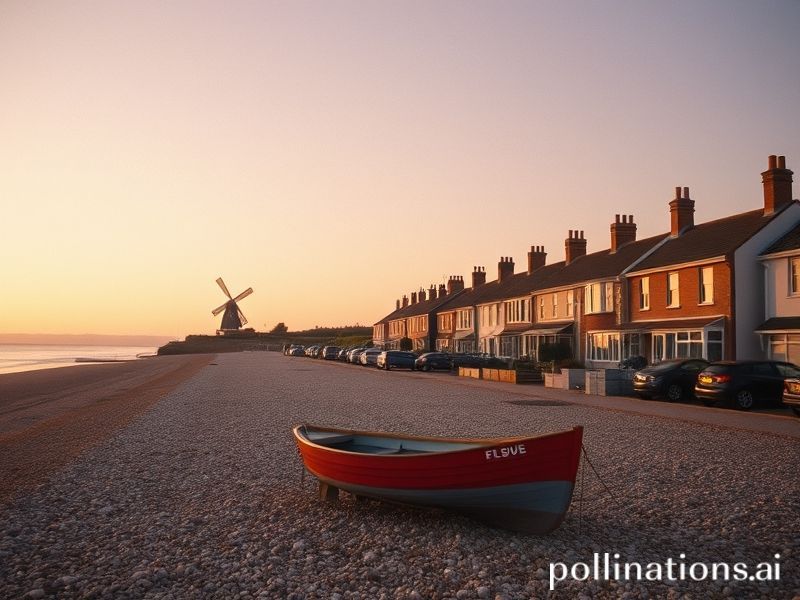Felpham: The Tiny English Village Exporting Delusions to the Entire Planet
Felpham: The Village That Accidentally Became a Global Metaphor
by “Sir” Reginald Blight, Senior Coastal Stringer-at-Large
Drive ninety minutes south-west from London, past the duty-free cathedrals of Gatwick and the Brexit car parks of Crawley, and you will eventually spill onto a pebble beach where gulls scream like unpaid interns and the air smells faintly of low-tide regret. This is Felpham, West Sussex—population 9,500, two pubs, one post office, and, improbably, the fulcrum on which the modern world keeps teetering.
William Blake lived here in 1800, hallucinating angels in the hedgerows and composing “Jerusalem,” the unofficial English national anthem now belted at rugby matches between beer commercials. Two centuries on, Felpham still exports visions: every CCTV camera, crypto-bro beach selfie, and algorithmic mood ring can trace its DNA to a fever dream that started in a thatched cottage overlooking the English Channel. The village’s biggest export is no longer wool or smuggled brandy, but the notion that somewhere small and damp can punch far above its climatic weight.
Take last month’s incident: a viral TikTok claimed Felpham’s beach pebbles were “charged lunar crystals” capable of curing both credit-card debt and long Covid. Within 72 hours, pilgrims arrived from Los Angeles carrying Himalayan salt lamps and unresolved trauma. The local council, whose emergency budget is mostly earmarked for seagull-related lawsuits, responded by cordoning off the shoreline with the same plastic fencing used for queue management at passport control. The crystals turned out to be flint; the pilgrims left poorer but spiritually exfoliated. Meanwhile, Alibaba listed “Authentic Felpham Moon Pebbles” at $29.99 a bag, shipping from Shenzhen.
Global supply chains are funny that way: a pebble that has spent 4.6 billion years being indifferent suddenly acquires a SKU. Felpham now sits on the fault line where folklore meets late-stage capitalism, a place where DHL vans outnumber fishing boats and the parish newsletter includes a crypto-currency column (“Father Nigel’s Holy Ghost Coin: Blessings 2.0”). The village’s only ATM dispenses both pounds sterling and Dogecoin, presumably so locals can hedge against whichever collapses first.
From a geopolitical angle, Felpham is Britain’s soft-power micro-laboratory. When Beijing wants to understand how a fading empire monetises nostalgia, it sends observers to count the number of Union Jack tea towels sold per capita. When Silicon Valley needs a focus group for “mindful coastal living,” it rents the entire fish-and-chip shop for a weekend and replaces the vinegar with adaptogenic kombucha. Even Vladimir Putin’s yacht allegedly dropped anchor offshore last summer, though Russian state media insisted it was merely “inspecting maritime cultural heritage.” The yacht’s jacuzzi was later spotted on eBay.
Environmentalists, meanwhile, treat Felpham as a canary in the coal mine of rising seas. Each winter storm peels another slice of promenade into the drink, a slow-motion amputation live-streamed on the Environment Agency’s Twitter feed. The village’s solution? A £37 million “adaptive revetment” paid for by a carbon offset scheme tied to a Saudi golf tournament. Nothing says climate resilience quite like a seawall funded by sand traps in the desert.
Yet amid the absurdity, something stubbornly human clings on. The bowls club still enforces a dress code of collared shirts and existential dread. The bakery sells “Blake’s Angel Cakes” with edible gold leaf that flakes onto your fingers like gilt on a collapsing empire. And every evening, pensioners and TikTokers gather on the green to watch the sun bleed into the Channel, sharing thermos tea and CBD seltzer in a fragile truce.
So here’s the takeaway, dear reader: If you want to understand how the 21st century metabolises myth, money, and rising tides, skip Davos and come to Felpham. Bring a reusable tote; the gulls have unionised. And remember—the pebbles are just pebbles, until someone decides they’re not.







